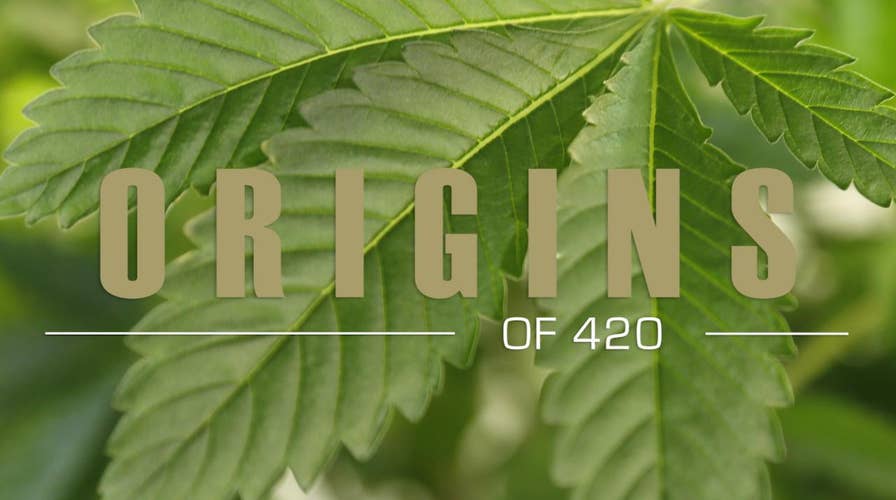Weed day: Where did ‘420’ come from?
Cannabis expert Matthew Greene breaks down the myths and reveals where the phrase ‘420’ actually originated
Friday is 4/20 – April 20 – a day that has become an international counterculture holiday to smoke or ingest marijuana. Senate Minority Leader Chuck Schumer, D-N.Y., told Vice News he will mark the occasion by introducing legislation to remove marijuana from the U.S. Drug Enforcement Administration’s list of controlled substances, leaving it up to the states decide how to regulate the drug.
In addition, Sen. Cory Gardner, R-Colo., recently announced that President Trump has committed to allowing Colorado’s legal marijuana industry to continue operating, despite the federal law that classifies marijuana as illegal.
Both Schumer and the president are wrong. We don’t need to move toward nationwide marijuana legalization – despite pressure by big companies that want to make big bucks off legalized pot.
Remember Big Tobacco? The mega-industry where tycoons profited off addiction and brought about a painful national experience after lying about the harm to health caused by their products? Remember their relentless advertising to kids, minorities and lower-income communities?
These big tobacco companies are back – and they have their eyes set on marijuana to become their next product.
Examples of Big Tobacco’s influence on marijuana legalization are multiplying. Tobacco companies are hiring pot execs to join their board of directors. Imperial’s chairman, Mark Williamson, said Imperial would benefit from this executive’s experience in “wider consumer adjacencies” – code word for pot.
It has long been reported that tobacco wholesalers in Massachusetts have also been angling to get in on the pot market. The director of a Northeast tobacco trade group even emailed the state treasurer asking her to appoint him as the state marijuana commissioner.
If you start to connect the dots, it’s clear what’s going on here: Big Tobacco is joining forces with Big Marijuana. Tobacco executives are looking to capitalize on this nascent industry by using the same exact playbook as they did in the 20th century to hook kids, distort science and target minorities.
Pot is no longer about Woodstock. It’s about Wall Street.
It’s time we put the brakes on this movement – the sooner, the better.
Pot special interests see kids, minorities, and disadvantaged communities as business opportunities. A relentless marijuana lobby continues to block controls on advertising, labeling, shape, and color of their products – as if a colorful “kush pop” or “pot tart” isn’t especially appealing to kids.
When Colorado Gov. John Hickenlooper wanted to limit access to marijuana magazines containing cartoon ads and coupons for $1 joints by placing them behind the counter and out of reach of children, the marijuana industry stopped him when it sued and won.
Look closer, and you’ll see that in Denver, the epicenter of legalized weed, it’s the lower-income, black and Hispanic neighborhoods that host pot shops catering to the city’s wealthier residents.
In one such neighborhood, there is one pot business for every 47 residents. Just like Big Tobacco, Big Marijuana would like us to think that its products are healthful and helpful for these Americans.
But in the two years after Colorado legalized marijuana, the number of Hispanic and black kids arrested for marijuana-related offenses rose 29 and 58 percent, respectively. The number of white kids being arrested for identical crimes dropped 8 percent in the same period.
In states that have legalized marijuana, the black market continues to thrive, youth pot use is increasing, and the number of fatal drugged car crashes is skyrocketing. We don’t have to legalize and commercialize marijuana to reform our nation’s criminal justice system. It’s not too late.
When Washington state and Colorado legalized pot in 2012, most people didn’t know they were voting for a massive new special interest group selling pot gummy candies and sodas, placing shiny billboards normalizing teen pot use, or opening up more pot shops than Starbucks in their neighborhoods.
We still have the chance to stand up and push back against this multibillion-dollar industry before we live to regret another public health tragedy. Now is the time to stop and ask if we are sure we’re moving in the right direction on marijuana.
That doesn’t mean jail is the answer for pot users, either. We should reorient our marijuana policy towards education and awareness.
But why swing between the two extremes of incarceration and commercialization? We can do better.
Polls find that when Americans are given choices on marijuana policy – rather than straight up legalization or criminalization – many choose decriminalization instead of legalization. That would mean marijuana use wouldn’t be criminalized, but selling and commercializing pot in stores wouldn’t be legal either.
Our country banned smoking ads on television in the early 1970s, and has been struggling to contain drunk driving for almost as long. And we all know what Big Pharma’s influence is doing to our country.
Tobacco, alcohol and opioid drugs combined kill more people than all illegal drugs ever have. Yet the corporate interests funding pot seek to turn back the clock four decades on all of these issues, because selling THC candy and kid-friendly items is good for their bottom line.
What’s good for a few billionaires isn’t always what is good for the rest of us.





















